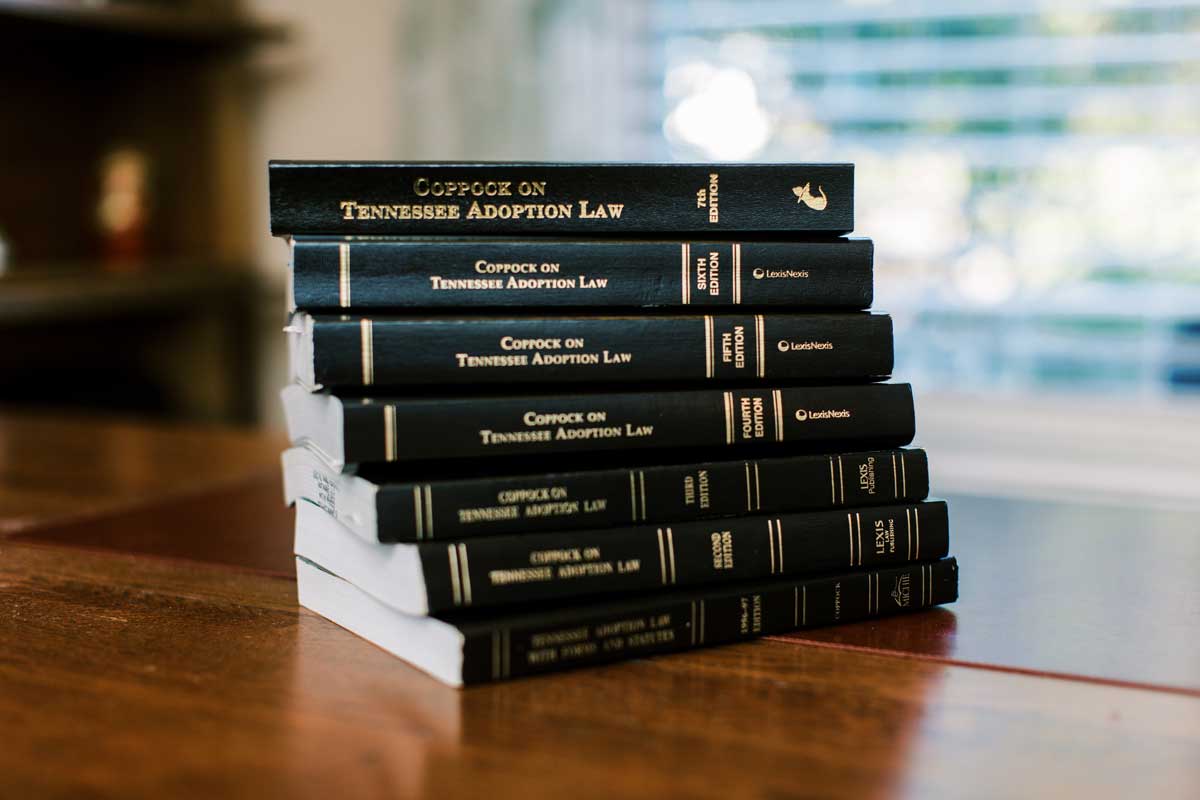Summary of Tennessee Adoption Law
The Tennessee statutory law is found at Tennessee Code Annotated § 36-1-101 et. seq. Adoption law is also made through case law and various state and federal laws and regulations.
Your questions answered about Tennessee Adoption Law:
- What is adoption?
- Who may adopt?
- Who may not adopt?
- Who may be adopted?
- What is a home study?
- Where are adoptions filed?
- Who’s parental rights must be terminated?
- How are parental rights terminated voluntarily?
- How are parental rights terminated involuntarily?
- What expenses can be paid to a birth mother?
- Can I get a federal adoption tax credit?
What is adoption?
Adoption is the legal process of permanently transferring parental rights and responsibilities to a child from the child’s biological family to the adoptive family “the same as if the child had been born to the parent(s), for all legal consequences and incidents of the biological relation of parents and children.”
Relative Status – The status of being or not being related has a large bearing on the legal processes involved. “Related” is determined by the adoptive parents’ relationship to the child, not the child’s parent, and is defined as grandparents or any degree of great-grandparents, aunts or uncles, or any degree of great-aunts or great-uncles, or step-parent, or cousins of the first degree, or first cousins once removed, or any siblings of the whole or half degree or any spouse of the above listed relatives.
Who may adopt?
- U.S. citizens & non-citizens may adopt.
- Single people and married people may adopt.
- Straight and gay people may adopt.
- People 18 years of age and older may adopt.
- Adoption petitioners must have physical custody at the time they file the petition for adoption.
- Adoption petitioners must have an approved home study except,
- in adult adoption
- intercountry readoption, and
- adoptions by step parents and relatives if the court waives the home study requirement at the petitioners’ request.
- Petitioners must live or maintain a regular place of abode in Tennessee at the time of filing the adoption petition unless:
- Petitioners have received an order of guardianship from a Tennessee court.
- A Petitioner is in the military and stationed outside of Tennessee but,
- maintained a regular abode in Tennessee prior to entry in the military, or
- identified Tennessee as their state of legal residence.
- A Petitioner is in the military and stationed outside of Tennessee but,
- Petitioners have received an order of guardianship from a Tennessee court.
Who may not adopt?
- One member of a married couple cannot adopt without the other spouse adopting as well.
- Two unmarried people cannot adopt the same child. (Example: Adult raised by a foster mother would like for the foster mother and a biological uncle to be her legal parents. Unless the foster mother and uncle are married to one another, this is not permitted.)
- Sometimes a single parent, usually a mother, will want one of her relatives to adopt the child, terminating the birth father’s rights, but without terminating her own rights. While this may sometimes be in the best interest of the child, the requirement that both parents’ rights be terminated before adoption only except in step parent adoptions, and therefore the desired adoption is not permitted.
- A non-related person without a home study.
- Dead people (Sometimes a grandmother, for example, will adopt and want her deceased husband included in the action. This is not allowed.)
Who may be adopted?
Any person, irrespective of place of birth, citizenship or place of residence, may be adopted or readopted in Tennessee, and an adult may be adopted. Federal law prohibits agencies receiving federal funds from requiring any child to wait for an adoptive placement for the purpose of racial matching.
While non-U.S. citizens may be adopted in Tennessee, adoption by U.S. citizens will not necessarily mean that the adopted person, adult or child, is then eligible to become a U.S. citizen. Those seeking to adopt to obtain an immigration advantage should consult an immigration attorney before pursuing adoption.
What is a home study?
A home study is an investigation by a licensed child-placing agency of the prospective adoptive parents and their home to determine the fitness of prospective adoptive parents. Common inquiries include:
- Whether they can financially afford a child,
- Whether they are medically healthy enough to raise a child,
- Whether the prospective adoptive parents and their marriage appear stable (no violence, alcoholism, substance abuse, mental illness, criminal history, etc),
- Whether they can provide a safe home for a child.
A non-related prospective adoptive parent must obtain an approved home study in order to complete the adoption process. The home study is good for one year.
Where are adoptions filed?
Chancery and Circuit Court, usually in the county where the prospective adoptive parents reside, but other counties may also be permitted.
Who’s parental rights must be terminated?
- Legal parents (Mother and her husband (if married within 300 days of the child’s birth))
- The child’s guardians appointed under the adoption code and after termination of parental rights
- A man who has been declared to be the father of the child by the adoption court subsequent to the filing of the petition to adopt but before the adoption is finalized.
- Putative biological father. Whether a man is a putative father requires the advice of an attorney familiar with Tennessee adoption law and that will ultimately be made by a judge.
You do not need to terminate the parental rights of:
- A man whose petition for paternity has been denied.
- A person who is dead.
- A sperm donor, in certain limited situations.
- A man who is on the birth certificate because the mother falsely stated that they were married, but who a court has found is neither the legal or biological father of the child.
- An unknown birth father and certain inactive biological, but not legal or putative, fathers. This determination can only be made by an attorney and ultimately by a judge.
How are parental rights terminated voluntarily?
- A man who is not on the child’s birth certificate nor married to the mother may sign a Waiver of Interest. This document is set out in the Tennessee Code and may be signed pre-birth and is immediately irrevocable. It is a valid termination of parental rights as long as an adoption takes place. If signed pre-birth, the birth father must see a statement signed by the mother naming him as the child’s father before he signs the Waiver.
- A legal father who is not the biological father may sign a Denial of Paternity. This document is set out in the Tennessee Code and may be signed pre-birth and is immediately irrevocable. This document along with credible proof that he is not the father, such as a sworn statement of the mother or DNA testing, can avoid the need for a consent or termination of parental rights from the legal parent.
- A birth mother, legal father or biological father may sign a particular consent form called a “surrender” before a judge or chancellor. This form is also set out in the Tennessee Code. The surrender has a 3 day revocation period. After the revocation period, the surrender is irrevocable without a showing of fraud or duress. A surrender must be accepted by an agency or prospective adoption parents. To accept a surrender, the adoptive parents must have an approved home study and physical custody of the child. The surrender may take place in any county before any chancellor, circuit judge, or juvenile judge. Other government officials may preside over a surrender if the surrendering birth parent is in another state, another country or in prison.
- A birth parent in an adoption by a relative or step parent may sign the petition for adoption as a Co-Petitioner to provide their consent. Signing the adoption petition is the most common method of consent used in step parent and relative cases. The petition must be signed before a notary.
Non-lawyers, please do not find adoption consent documents, print them and present them to parents for signature. This rarely results in a consent that is usable for an adoption. The conditions for using each type of consent are very specific and strict. This is a simple summary of a complex area of law and does not include all the requirements. Sometimes an ineffective attempt at securing a consent can be counter productive.
How are parental rights terminated involuntarily?
An involuntary termination of parental rights begins with a lawsuit filed by the prospective adoptive parents, an agency, DCS or the Guardian ad Litem, who is then called “the petitioner.” This is a lawsuit against the child’s birth parent(s) whose rights have not otherwise been terminated. The petitioner must prove at least one particular ground to terminate a parent’s rights and that termination of parental rights is in the child’s best interest for the court to grant termination of parental rights.
The birth parent(s) must be served with the petition for termination of parental rights. Ideally, this should occur by personal service. Personal service occurs when a properly issued summons and a copy of the petition to terminate parental rights is personally served on the parent by a process server or other qualified person. If personal service is not possible, the court may grant permission for service by publication.
If, within 30 days after completion of service, the birth parent does not answer the petition, the petitioner can ask to win by default or because the other side did not answer. The request for default is set on the court’s docket, and all parties are notified of the hearing date. If the birth parent does not appear and defend, the petitioner must still offer the court proof of grounds and best interest, and if this is done, the default judgment is usually granted.
If the birth parent answers within 30 days of service, the matter is generally set for trial and each side will have an opportunity to be heard before the judge decides whether grounds exist and if so, whether termination of parental rights is in the child’s best interest.
A contested termination of parental rights can be complex and prolonged litigation, despite efforts in the law to speed up these cases.
What expenses can be paid to a birth mother?
Never pay or receive money related to an adoption without clearing it with an attorney first. When a pregnant woman makes a plan to place her child for adoption, prospective adoptive parents may pay some of her living expenses. The time period and types of expense payments allowed are strictly limited. To pay something other than the listed items is a Class C felony, punishable by 3-15 years in prison and a fine not to exceed $15,000.00. The information here is provided for general information only and should not serve as a basis for making any payments in the context of an adoption.
Upon entering into an adoption plan and for 90 days after the birth of the baby, a birth mother may receive payment for the following reasonable and actual expenses: housing, utilities, transportation, maternity clothes, and food. Expenses must, whenever possible, be documented by receipts, invoices, rental agreements, or other written verification of expense, and must be reviewed by the court before which the birth mother surrenders or consents to adoption. If documentation is not otherwise available, then the birth mother and prospective adoptive parents shall execute an itemized affidavit stating the specific reason for each payment, the amount paid, the date paid, and to whom each payment was made.
If the birth mother wants counseling, the prospective adoptive parents are required to pay for that counseling for up to two years. The prospective adoptive parents are also required to pay for the birth mother to have an attorney, if she chooses to have one. The prospective adoptive parents also customarily pay for medical expenses not covered by insurance for the mother and baby.
Licensed adoption agencies may pay expenses with less restrictions but traditionally, they do not.
Payment to an intermediary who is not a licensed child-placing agency for matching the birth mother with the adoptive parents (facilitator) is illegal in Tennessee.
Can I get a federal adoption tax credit?
The federal government offers a valuable tax credit for many types of adoptions. Refer to the IRS publication for specifics. Adoption Tax Credit Information
Generally, the following types of adoptions are eligible for a federal tax credit:
- Special Needs Adoptions- this type of adoption may permit a tax credit in excess of money spent pursuing the adoption
- State Agency Adoptions (in Tennessee this is the Department of Children’s Services)- this type of adoption may permit a tax credit in excess of money spent pursuing the adoption
- Private or Independent Adoptions
- Agency Adoptions
- Relative Adoptions (except step parent adoptions)
- Intercountry Adoptions (only eligible if finalized)
- Expenses paid pursuing all the above types of adoption, except intercountry, could be credited even if the adoption is never finalized.
The following types of adoptions are NOT normally eligible for the federal adoption tax credit:
- Adoptions in connection with surrogacy arrangements
- Step parent adoptions
- Adult adoptions
Important Notice
This summary is a very general overview of a complex body of law and is intended for only the most preliminary uses and should not be the basis for decisions or actions. In addition, the law changes rapidly and this website does not.
Lawyers should verify statements against current law.
Non-lawyers should not use the information on this website and other general statements of law as a substitute for the advice of a Tennessee attorney with knowledge of the facts of your particular case.
Dawn is Ready to Help with Your Unique Adoption Case
For over 30 years, Dawn has been an adoption and child-welfare advocate nationally and in Tennessee. She knows where the system is working and the places that it is not. She offers her frank assessment to policymakers (Public Outcry), and sometimes they listen. She has drafted and passed many child-welfare bills in the Tennessee Legislature, founded, encouraged and supported advocacy organizations, educated lawyers and judges on good practice, and pointed out places that we can do better for our children, openly and behind the scenes at every opportunity. To see what Dawn has been up to recently visit her Legislative Blog.
Dawn represents families in most types of adoption and termination of parental rights cases. She also frequently consults with foster parents. Her time is increasingly dominated by writing, training, consulting, and meditating, so she can’t take every case with merit. She continues to take almost all uncontested adoptions, like agency and DCS cases and relative adoptions with consent or where the other party is unlikely to contest. Even when she can’t take a case, a consultation permits Dawn to share her experience about whether it is the right time to file a case, and if so, exactly what and where to file, and to create a litigation plan. She even suggests possible lawyers to complete the case.
If a termination of parental rights case is already underway, Dawn can also consult with one party or mediate for all parties but of course, not both.
If you want to talk with Dawn about your case: please contact Angela Newsome, paralegal, for information on Dawn’s availability and to schedule an appointment.
Rubber Ducks in Law Office?
When Dawn finalizes an adoption, she gives the adopted child (or adult) a rubber duck. For virtual finalizations she mails them. It is a fun celebration of the new beginning and almost always gets a smile!





